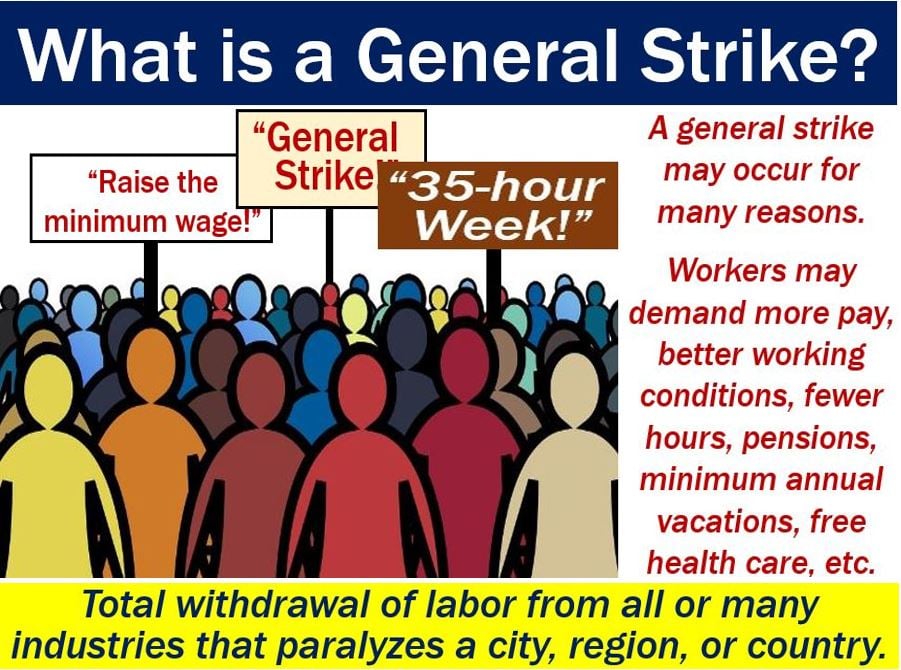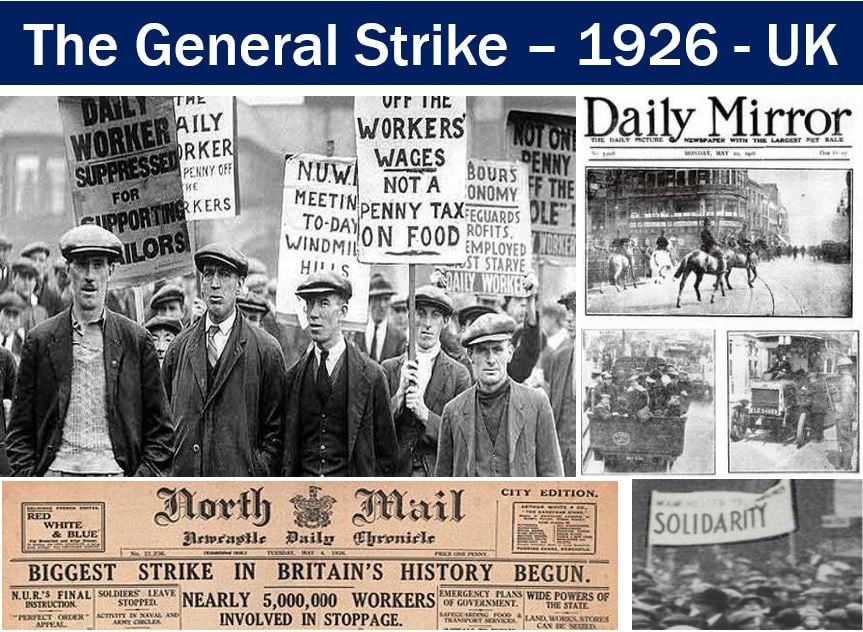A general strike is a strike that hits all or most industries and a large geographical area. The strike may affect a city, region, or even the whole country. In other words, a huge number of workers across many business sectors protest by refusing to work.
Trade unions and their workers organize the strike to bring the region to a standstill. They aim to gain concessions from their bosses, the government, or both. Most strikes are about working conditions. They may also be about pay and hours of work.
The term ‘mass strike‘ has the same meaning as ‘general strike.’ Virtually every country in the world has experienced this type of strike.
In this context, a strike is a refusal to work that employees and often their union organize. It is a form of protest. People who are on strike are ‘strikers.’ The verb is ‘to strike‘ or ‘to go on strike.’
General strikes first emerged in the middle of the nineteenth century. They have characterized several historically major strikes.
In fact, without them, workers today wouldn’t have the rights they do, many historians claim.

A general strike is a strike in which most workers in a city, county, state, or country refuse to work. They may be demanding better pay, a minimum wage, working conditions, pensions, etc. This kind of strike is less common today than one hundred years ago.
General strike – ancient history
Before the modern general strike appeared, however, workers would take extreme measures.
In ancient Rome, plebeian citizens, i.e., the plebs, would abandon the city en masse. Put simply; members of the ruling class suddenly found they had no help and had to do everything themselves.
People called it the Secessio Plebis, which is Latin for ‘withdrawal of commoners’ or ‘secession of the plebs.’
General strike – modern history
What we know as a general strike did not appear until the Industrial Revolution.
During the Industrial Revolution, large numbers of workers had become members of the industrial working class. They lived in relatively large cities and exchanged their labor for wages.
The Chartist movement reached its peak in the 1830s. This was when ‘workers’ consciousness’ began to awaken in the British Isles and the United States.
In 1835, the Philadelphia General Strike occurred in the United States. It lasted three weeks. The striking workers won their goal of an increase in wages and a ten-hour workday.
After the First World War, there were political convulsions in many parts of the world. In 1919, there was a general strike in Germany. Other mass strikes also appeared in Winnipeg, Belfast, and Seattle in the same year.

Coal prices had plummeted. Mine owners announced their plan to reduce miners’ pay. The Miners Federation of Great Britain flatly reflected the terms. Soon, other trade unions came out in sympathy. It was not long before workers across the country withdrew their labor.
The General Strike, UK
In 1926, there was a general strike in the United Kingdom. In the UK, people refer to it today as The General Strike. The strike lasted from 3 May to 12 May 1926.
The TUC called the strike in protest against the reduction of wages for 1.2 coal miners. TUC stands for Trades Union Congress. The miners had been locked out. They also protested about worsening conditions.
During those nine days, approximately 1.7 workers were on strike. Heavy industry came to a standstill. Public transport was also seriously disrupted.
However, the government had prepared for the strike and enlisted volunteers to maintain essential services. The volunteers were mostly middle-class citizens.
Although the strike hit the whole country, the strikers were unsuccessful in their attempt to get the government to back down.
The General Strike hit industry and services nationwide. Additionally, workers were angry. However, it was not violent.
